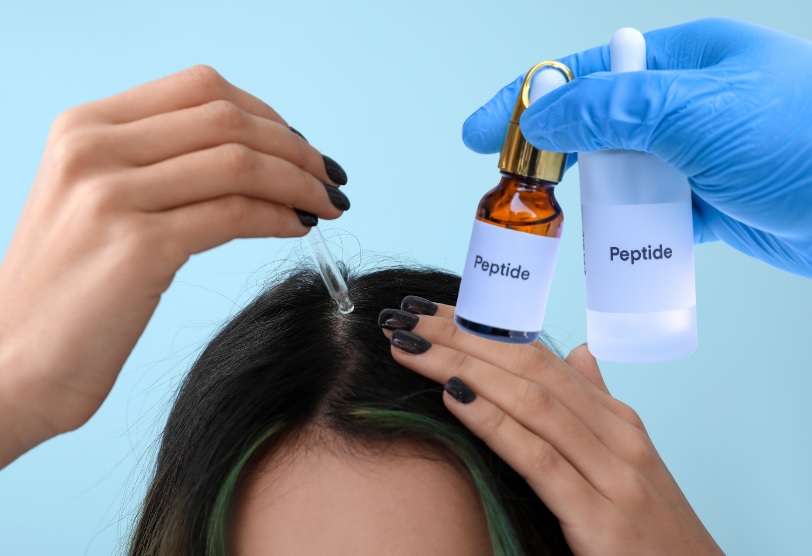
How effective are copper peptides for treating hair loss in women?
Copper peptides have garnered attention for their potential benefits in promoting hair growth. Here’s a comprehensive look at how copper peptides might help with hair growth in women:
What Are Copper Peptides?
Copper peptides are small protein fragments that have an affinity for copper ions. The most well-known copper peptide is GHK-Cu (glycyl-L-histidyl-L-lysine). They are known for their ability to:
- Promote Angiogenesis: Copper peptides can stimulate the formation of new blood vessels, improving blood flow to hair follicles.
- Increase Collagen Production: They enhance the production of collagen and elastin, which are important for maintaining healthy scalp and hair.
- Anti-Inflammatory Properties: Copper peptides have anti-inflammatory effects, which can help in reducing scalp inflammation that might contribute to hair loss.
- Stimulate Hair Follicles: They may help to extend the growth phase (anagen phase) of the hair cycle.
Mechanism of Action
Copper peptides work by influencing various biological processes:
- Wound Healing and Tissue Repair: They accelerate the healing of micro-wounds on the scalp, creating a healthier environment for hair growth.
- Cell Proliferation: They encourage the proliferation of dermal papilla cells, which play a crucial role in the regulation of hair follicle development and growth.
- DHT Reduction: Some studies suggest that copper peptides might help in reducing the levels of dihydrotestosterone (DHT), a hormone linked to hair loss in both men and women.
Benefits for Women
For women experiencing hair thinning or loss, copper peptides offer several potential benefits:
- Thicker, Fuller Hair: By promoting the growth phase and reducing hair loss, copper peptides can lead to thicker and fuller hair.
- Reduced Hair Shedding: Regular use can help decrease hair shedding, resulting in improved hair density.
- Improved Scalp Health: By reducing inflammation and enhancing wound healing, copper peptides contribute to a healthier scalp, which is essential for hair growth.
Application and Use
Copper peptides are typically found in:
- Topical Solutions: These can be applied directly to the scalp. Products like serums and sprays are common.
- Shampoos and Conditioners: Some hair care products are infused with copper peptides for daily use.
Scientific Evidence
- Studies and Research: There is some scientific evidence supporting the efficacy of copper peptides in hair growth. For example, a study published in the “Journal of Cosmetic Dermatology” indicated that GHK-Cu improved hair growth and thickness in participants .
- Clinical Trials: Clinical trials are limited but ongoing, and many users report positive anecdotal results.
Considerations
- Consistency: Regular application is crucial to see results.
- Side Effects: Copper peptides are generally well-tolerated, but some individuals might experience mild irritation or allergic reactions.
- Combination with Other Treatments: Copper peptides can be used in conjunction with other hair growth treatments, like minoxidil, for enhanced results.
Conclusion
Copper peptides hold promise as a treatment for hair growth in women, with their multifaceted approach to improving scalp health, reducing inflammation, and stimulating hair follicles. While more extensive clinical trials are needed to fully establish their efficacy, current research and user experiences suggest they can be a valuable addition to hair care routines for those dealing with hair thinning or loss.


Leave a Reply